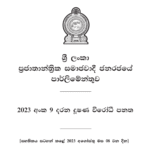The context provided includes several case laws related to partition actions. Here is a detailed list of those case laws, along with their relevance:
- Golagoda v. Mohideen (40 N.L.R page 92):
- This case established that a court should not enter a decree in a Partition Action unless it is perfectly satisfied that the persons in whose favour it makes the decree are entitled to the property. It emphasizes the necessity of the court to investigate the title thoroughly before making a partition decree.
- Sopaya Silva and Another v. Magilin Silva (1989) 2 Sri L.R 105:
- In this case, the learned District Judge dismissed the case on the grounds that the lis pendens was wrongly registered. The Court of Appeal held that the registration of lis pendens was not a trivial matter.
- Perera v. Perera (1 N.L.R 362):
- The Supreme Court held that a partition suit should not be decided merely on issues raised by the parties, and a decree should not be made unless the court is satisfied that the claimants are entitled to the property sought to be partitioned.
- Richard and Another v. Seibel Nona and Others (2001) 2 Sri L.R. 1:
- This case reiterated the duty of the judge to fully investigate into title to the land and shares before making a partition decree.
- Gunathilake v. Murieal Silva (79 N.L.R 481):
- The Supreme Court emphasized the duty of the court in a Partition Action to investigate the title of parties under Section 25 of the Partition Act.
- Appuhamy Vs. Weerathunga (46 NLR 46) and Gunasekara Vs. Soothannona (1988) 2 SLR 8:
- These cases held that the original scheme of partition proposed by the commissioners should not be lightly rejected.
- Albert Vs. Ratnayake (1988) 2 S.L.R. 246-249:
- Justice Wijetunga held that the court can consider an appropriate case a scheme of partition that has not been anticipated, ensuring justice is served.
- Peiris v. Peiris:
- This case is mentioned in the context without a specific citation or detailed outcome, but it is implied that it deals with the importance of investigating title in partition cases, as a partition decree binds the entire world.
These cases collectively emphasize the importance of a thorough investigation of title and the rights of the parties involved in a partition action before the court can make a decree. They also highlight the significance of the court’s role in ensuring that the final scheme of partition is fair, reasonable, and justifiable.













